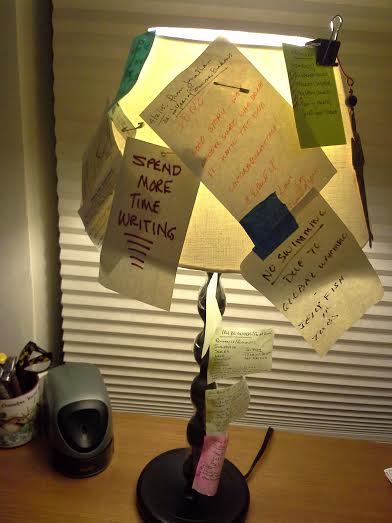How to Notch Up Your Writer Discipline. For starters, write regularly. Let the rich experience of creativity sink deep into your psyche until you feel out of balance without it. I used to say, “One page or one hour a day minimum.” Now I say, “Often enough to feel the need to return the next day.”
Discipline Your Work Environment. Carve out a corner of your own. Virginia Woolf talked about “a room of your own.” Crowded circumstances can preclude that. A space that encourages a writing mood will suffice. Make that space as private and comfortable as you need it to be. Keep your writing paraphernalia nearby. Notebooks, files, pens, computer, a lamp shade covered in story ideas.
Acquire Quality Writing Equipment. Do so by disciplining your spending on other things if that is necessary. Most important, do so by believing this absolutely crucial truth. You deserve what you need to succeed.
Discipline Your Commitments. Cut out every non-writing activity that you can. Ask yourself, “Is there somebody else who can do this? Does it have to be me?” Say no to new requests for your time and energy. Ease the inevitable disappointed reaction with a smile and this gentle suggestion. “Ask me again next year.”
The Exception is When You are Paying It Forward. Invest in your career by investing yourself in your writing community as often as you can manage. Find a balance that benefits both you and others. Do not hide your generosity. Serve in the spotlight, but do not brag. Graciously accept thanks and acknowledgement of your efforts.
Discipline Your Family and Friends. Post your work hours. The refrigerator door is a good place to do that. Insist on no interruptions at those times. Tell your people how important your writing is to you. Make them hear you. Eventually, they will get it. Do not back down.
Discipline Your Telephone. List your daily work hours on your voicemail message. Say that you do not take calls during your work hours and mean it. Keep a smile in your voice, but do not apologize. Mention the hours when you do receive calls. Eventually, they will get it. Do not back down.
Discipline Your Online Activity. Identify your personal online time-burners. Activities that are minimally productive to your career. If you cannot resist, do not indulge during your best brain time. Never indulge during your writing work hours. Use your online activity to build your career, your public platform, your visibility. Limit online playtime to your dim brain hours.
Escape-Write through Stress. Life is full of stressful situations. They can stop your writing progress in its tracks. Use that stress to enhance your writing instead. Powerful storytelling is intense, so is stress. Incorporate how you are feeling into a dramatic scene from your current work. Your body, breath, immediate environment. Feel it all. Adapt it all.
The Purpose of Discipline is to Carry You Deep into Your Story and Keep You There. John Gardner called this place “the dream of the book.” Discipline helps you inhabit that dream and write from deep inside your imagination. Because deep inside is where your best stories live. Discipline helps you get there. How to Notch Up Your Writer Discipline.
**********
Alice Orr. Teacher. Storyteller. Blogs for writers at www.aliceorrbooks.com. Former literary agent. Author of 16 novels, 3 novellas, a memoir, and No More Rejections: 50 Secrets to Writing a Novel That Sells. Amazon says, “This book has it all.” Updated version coming soon. Look for all of Alice’s books HERE.
Alice’s latest novel – A Time of Fear & Loving – Riverton Road Suspense Series Book 5 – is available HERE.
Praise for A Time of Fear & Loving: “Alice Orr is the queen of ramped-up stakes and page-turning suspense.” “Warning. Don’t read before bed. You won’t want to sleep.” “The tension in this novel is through the roof.” “I never want an Alice Orr book to end. The best one yet!”
https://www.facebook.com/aliceorrwriter
http://twitter.com/AliceOrrBooks/
http://goodreads.com/aliceorr/
http://pinterest.com/aliceorrwriter/
This is fantastic, Alice. So many people (including our loved ones) think that writing is not “real work”.
I will share this with my other writing communities.
Hi Lisbeth. I is lovely to find you here. Yes. Too many of us must contend with this misunderstanding of the work we do. Writing sounds, and probably even looks, like play to the nonwriter. But those of us who practice its disciplines, and labor to produce from our imaginations the best of our best every writing day, know full well that to do so requires all that is in us, paragraph after paragraph, page after pafe. This is a major reason, in my opinion, why we all, as toilers in the fields of our art and craft, must support one another whenever and however we can. Because we do understand, and we do care, as perhaps noone else can. Love and Blessings. Alice
As always, Alice Orr, you provide sage advice and encouragement garnered from your experiences! Wonderful advice! I finally retired and turned my son’s old bedroom into my writing space. I also write elsewhere, but it’s great to have a special room, and it helps me to stay focused. Thank you! Happy Writing!
Hi Cathy. I am so glad that you finally have the time you have so long longed for to write your heart out every writing day. You have worked hard to get here, and you well deserve every glorious minute. I am overjoyed to hear you have a writing place as well. I send my blessings upon every inch and corner and honor the good work I have no doubt you will do there. May the muse be ever with you. Love. Alice
Alice, Good advice that I’ve followed not for my entire career but since the family has grown. I tell my critique friends to write every day even if it’s no more than a paragraph. If they wrote 100 words a day in a year, they would be well on their way to a book.
Yes, Janet, writing every day is the ideal if you can manage it. The secret to developing what I think of as a “positve addiction” to the practice, until a day without writing leaves us feeling restless, out of sorts and incomplete. Short of that, we must do as much as we can as often as we can. Nora Roberts once advised me to write everywhere, no matter what else might be going on, to find a corner and write whatever I could manage to get down in the notebook I must carry with me at all times. That advice carried me through a particularly chaotic period of my career and, obviously, it has worked like a charm for Nora herself. It is certainly nice to have “a room of one’s own” as Virginia Woolf described, but, when and if we lack access to that, an imagination of our own, plus a pen and a page to press its point upon, can definitely suffice. All we have to do is relax some of our situational needs and Keep on Writing Whatever May Occur. Love and Blessings. Alice
This stuff all works. Discipline has enabled me to write an publish 12 novels, a dozen short stories and novellas, and a host of other booklet freebies. I was fortunate to have an office and I put a sign on my door that read, “Please do not disturb me. I’m disturbed enough already.” lol Worked wonders.
Dearest Kayelle. You are an inspiration to me and to all of us who have had the good luck to encounter you in our writing lives. I consider you the perfect example of discipline and its rewards. The volume of your work, and the quality of the stories you tell, speak most eloquently of your dedication to your creative vision and to the practice of producing fine fiction in every book you write. What could be a better demonstration of the efficacy of discipline than that. Love and Blessings. Alice